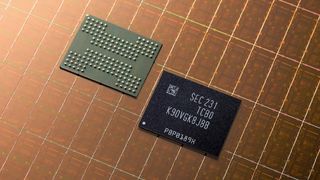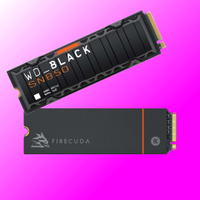MIT researchers create a super-fast, super-tough, super-slidey transistor and claim that in '10 to 20 years from now could change the world'
The ferroelectric material transistor could be used to make NVMe SSDs last a whole lot longer.

A small team of researchers at MIT's Materials Research Laboratory have developed a transistor that's just as good as those used to make flash memory chips, but with the added advantage of not wearing away with use. Instead of the usual silicon-based engineering, this one is made from a ferroelectric material.
Flash memory has revolutionized the storage industry and you can buy extremely fast and capacious NVMe SSDs for relatively little money these days. Despite all the advances in flash manufacturing, though, the technology still has one major issue—the tiny cells that store the digital information have a limited lifespan, as they wear away with each write/erase cycle.
So when the Massachusetts Institute of Technology announced (via Tom's Hardware) that its Material Research Laboratory had created a transistor which won't wear away in this manner, it immediately caught my attention. Rather than employing some kind of variation of the commonly used silicon-based, field-effect transistor (FET), it's all done with two thin layers of boron nitride, a ferroelectric transistor (FeFET).
When an electric field is applied, the layers slide over each other, changing the electrical properties of the material. The switching of the states takes place in nanoseconds, so that's on par with what's used in current NAND flash memory (pdf warning), but the researchers discovered that the transistor could undergo 100 billion switches without degrading very much.
Professor Raymond Ashoori, who co-led the research work, said "When I think of my whole career in physics, this is the work that I think 10 to 20 years from now could change the world." Professor Pablo Jarillo-Herrero, another associated with the work, said "This is one of the first, and perhaps most dramatic, examples of how very basic science has led to something that could have a major impact on applications."
That certainly sounds like the discovery could really form the start of a new paradigm for flash memory and everything that uses it.
Of course, there's a big caveat to all of this and it's not just because it's the classic "only in the laboratory" kind of discovery. The research team created one transistor and an average 1 TB NVMe SSD contains a few trillion of them, though current flash memory cells require multiple transistors to store just one bit.
The biggest gaming news, reviews and hardware deals
Keep up to date with the most important stories and the best deals, as picked by the PC Gamer team.
At the moment, mass-producing large wafers of chips from ferroelectric materials just isn't possible so you're not going to see super-slidey transistors powering your gaming SSDs any time soon. But as Ashoori says, who knows what will happen in a decade or two? Maybe every chip we use will have billions of boron nitride layers, all furiously shuffling about, just so we can store the latest games for longer than ever before.
Best SSD for gaming: The best speedy storage today.
Best NVMe SSD: Compact M.2 drives.
Best external hard drive: Huge capacities for less.
Best external SSD: Plug-in storage upgrades.

Nick, gaming, and computers all first met in 1981, with the love affair starting on a Sinclair ZX81 in kit form and a book on ZX Basic. He ended up becoming a physics and IT teacher, but by the late 1990s decided it was time to cut his teeth writing for a long defunct UK tech site. He went on to do the same at Madonion, helping to write the help files for 3DMark and PCMark. After a short stint working at Beyond3D.com, Nick joined Futuremark (MadOnion rebranded) full-time, as editor-in-chief for its gaming and hardware section, YouGamers. After the site shutdown, he became an engineering and computing lecturer for many years, but missed the writing bug. Cue four years at TechSpot.com and over 100 long articles on anything and everything. He freely admits to being far too obsessed with GPUs and open world grindy RPGs, but who isn't these days?
Most Popular







